Q&A w/ author, Carl Hart – HIGH PRICE: A Neuroscientist’s Journey of Self-Discovery that Challenges Everything You Know about Drugs and Society
Written on June 18th, 2013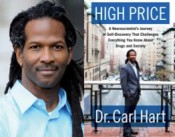 |
Aired: 06/16/13
This week’s guest, neuroscientist CARL HART grew up in one of Miami’s toughest neighborhoods and, in his first book, HIGH PRICE, he explores how it is that he avoided becoming one of the crack addicts he now studies.
Columbia University’s first tenured African American professor in the sciences, Hart goes beyond disputing myths, falsehoods, and ignorance about drugs, drug users, and drug policy. He has been engaged in cutting edge research since the late 90s, testing individuals with actual drugs. His controversial work is redefining our understanding of addiction. He examines the relationships between drugs, pleasure, choice, and motivation, both in the brain and in society. Hart’s findings shed new light on issues of race, poverty, and drugs, and help explain perhaps more clearly than ever why current policies are doomed to fail.
www.highpricethebook.com
Q&A w/ DANNY KENNEDY, ROOFTOP REVOLUTION: How Solar Power Can Save Our Economy and the Planet from Dirty Energy
Written on May 13th, 2013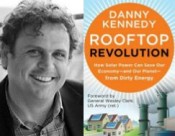 |
Aired: 05/12/13
Is there a revolution coming to your rooftop? While opponents claim solar is expensive, inefficient, and unreliable, in his book ROOFTOP REVOLUTION: How Solar Power Can Save Our Economy And Our Planet From Dirty Energy, DANNY KENNEDY makes clear solar can save money, create jobs, and protect the environment if only politics and perception will get out of the way.
During the recent Presidential campaign, we heard a lot about Solyndra, the solar start-up that received a sizable government loan only to go belly up. Solar’s detractors claim the collapse of Solyndra proves solar is just a hippie pipe dream, but Danny Kennedy, says the truth is quite the opposite. Solyndra failed because it wasn’t able to compete in a red-hot industry, not because solar isn’t ready for prime time.
The industry employs 100,000 people in the United States, twice as many as in 2009 and twice the number of coal miners. In 2011, Warren Buffett invested $2 billion in a solar farm, and General Electric bought a start-up solar manufacturer, announcing, “By 2020 this is going to be at least a $1 billion product line.” Production of solar-generated electricity rose by 45% in the first three quarters of 2010, while electricity from natural gas rose only 1.6% and coal declined by 4.2%. Kennedy argues for a rooftop revolution to break the entrenched power of the coal, oil, nuclear, and natural gas industries and their progress-denying allies.
www.rooftoprevolutionbook.com
www.sungevity.com
Q&A: Mark Mykleby, Natl Security=Sustainability
Written on April 8th, 2013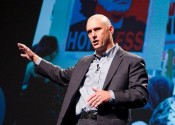 |
Aired: 04/07/13
In the preface to an article entitled A National Strategic Narrative, Anne-Marie Slaughter of Princeton says we need a narrative that confronts some of the following questions, “Where is the United States going in the world? How can we get there? What are the guiding stars that will illuminate the path along the way? We need a story with a beginning, middle, and projected happy ending that will transcend our political divisions, orient us as a nation, and give us both a common direction and the confidence and commitment to get to our destination.” She also writes, “In one sentence, the strategic narrative of the United States in the 21st century is that we want to become the strongest competitor and most influential player in a deeply inter-connected global system, which requires that we invest less in defense and more in sustainable prosperity and the tools of effective global engagement.”
Over time, the best way to shape the force of the future is to invest in the science, technology, education, and training that will equip our soldiers, sailors, airmen, and marines to adapt to an increasingly complex and dynamic environment. The hardware and software we buy and build are secondary to the gray matter we must cultivate now.
When I hear that someone high up in the military is talking seriously about sustainability, I take notice.
www.newamerica.net
Q&A: Howard Bloom, Author – THE GOD PROBLEM: How a Godless Cosmos Creates
Written on January 22nd, 2013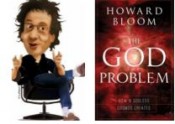 |
Aired: 01/20/13
HOWARD BLOOM has been called “next in a lineage of seminal thinkers that includes Newton, Darwin, Einstein,[and] Freud,” by Britain’s Channel4 TV , and “the next Stephen Hawking” by Gear Magazine. His books include The Lucifer Principle: A Scientific Expedition Into the Forces of History; Global Brain: The Evolution of Mass Mind from the Big Bang to the 21st Century; The Genius of the Beast: A Radical Re-Vision of Capitalism; and his latest, THE GOD PROBLEM: How a Godless Cosmos Creates.
Heavy stuff, sure, but his biography is a lot quirkier than that list might suggest. From 1968 to 1988, Bloom made his mark in the music business, founding and running its biggest PR firm, working with Michael Jackson, Prince, Bob Marley, Bette Midler, Queen, Simon & Garfunkel, Peter Gabriel, Grandmaster Flash and the Furious Five, among many others. He helped launch Farm Aid and Amnesty International’s American presence, and put together the first public service radio campaign for solar power.
Bloom launched a successful kickstarter campaign to raise money for PR for THE GOD PROBLEM because changing a paradigm doesn’t just happen. A lot of people have given glowing blurbs to this book, but let me quote one by Barbara Ehrenreich, author of Nickel and Dimed, “If Howard Bloom is only 10 percent right, we’ll have to drastically revise our notions of the universe. There’s no mysticism in The God Problem—no God, no religion, no incommunicable spiritual insights – just the contagious joy of a great mind set loose on the biggest intellectual puzzles humans have ever faced. Whether you’re a scientist or a hyper-curious layperson, Bloom’s argument will rock your world.”
www.howardbloom.net
Q&A: Osha Gray Davidson – Germany
Written on January 11th, 2013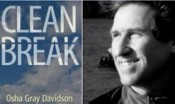 |
Aired 01/06/12
In the year 2000, Germany got 6% of its energy from renewables. That’s about what we get in the US today. But today Germany gets 25% of its electricity from solar, wind and biomass. And Germany is not exactly the American Southwest. Perhaps just as impressive and important, 65% of the country’s renewable power capacity is owned by individuals, cooperatives and communities. Clean and decentralized. I’ll be talking with Osha Gray Davidson about how they did it and what we can learn from their story.
Osha is new to me, but I contacted him immediately as soon as I saw his new book CLEAN BREAK: The Story of Germany’s Energy Transformation and What Americans Can Learn from It. As anyone who listens to this show knows, I feel one of the crucial elements in America’s sluggish response to many of our biggest challenges is our ignorance about what other countries do well.
www.oshadavidson.com
